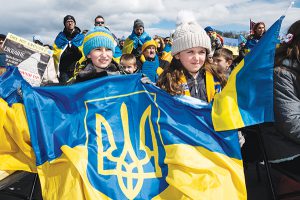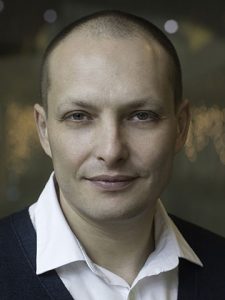Now that Vladimir Putin’s war on Ukraine is more than 100 days old and Ukraine fatigue is setting in for most people, I’m finally able to think more or less rationally about a calamity that has turned my world, and that of many like-minded Russians, upside down — though in a much less traumatic way, of course, than it has done for Ukrainians.
Trying to analyse the unjust war my country started will always be difficult; there’s a thin line between being analytical and being desensitised to the horror Russia has wreaked. Still, I’ve lost much sleep following events in minute detail, and I’d like to share the lessons I’ve drawn so far — with a necessary caveat. Being Russian, and having initially underestimated the madness that drove Putin to invade, I cannot make authoritative judgments.
The fog of war that obscured what was happening on the battlefield during the first weeks of the invasion has thinned somewhat. Military analysts initially relied on data from the Ukraine General Staff and Western intelligence services in part because they couldn’t find trustworthy Russian sources.
Since the first days, however, Russian nationalists — both on the ground and on the sidelines — have emerged as a surprisingly useful source that makes parsing official Russian propaganda largely unnecessary.
I get an eerie feeling when the Institute for the Study of War, the think tank that provides some of the most
detailed analysis of the battlefield situation, quotes someone called Boitsovy Kot Murz (literally, Purr the Fighting Cat) on the situation inside the Russian and pro-Russian separatist militaries. On the other hand, Murz — nationalist blogger Andrei Morozov — knows what he’s talking about and voices his criticism at no little personal risk. Igor Girkin, known by his nom de guerre Strelkov, also provides credible analysis of the Russian and pro-Russian troops’ troubles with poor command and logistics, as well as Moscow’s strategic failures. One of the key participants in the pro-Russian rebellion in eastern Ukraine in 2014, Girkin openly dreams of a role in the current war, but the Kremlin regards him as not loyal enough to get one. In part because of Girkin’s jealousy and frustration, his Telegram channel has been a must-read during this war.
Nationalists such as Morozov and Girkin root for a Russian victory with all their empire-loving hearts — but their deep hatred of the adversary is interlaced with an equally deep respect for Ukrainians’ fighting ability. The nationalists openly mistrust, often despise, the Putin top brass. They never believed in the blitzkrieg that Putin apparently thought he was about to carry out. They also have access to sources in various branches of the invading army, from the separatist militias to the Wagner private military company to regular units. Weighed against information coming from Ukrainian and Western sources, their insight and analysis provide much-needed balance, a job at which the Putin propaganda machine fails miserably.
The nationalists’ voices are also important because, in the event of a Russian defeat, they probably will be heard loudly; they might even end up as the country’s next revanchist driving force. Their sincerity will buy them popular support if the regime weakens and is unable to keep Russians in check by repression alone. Given that the remains of Russia’s liberal opposition largely have left the country since the war began, giving up any realistic claim on a major role in the post-Putin future, the likes of Girkin and his comrades inside and
outside the invading army are the most credible non-regime force left. They are also in many ways more dangerous to Russia itself and its neighbors than Putin and his team of crooks and sycophants.
In the first days of the war, most serious analysts believed a Ukrainian defeat was imminent. In later weeks, haphazard, overoptimistic, poorly planned Russian moves caused the Russian military to be seen as something of a paper tiger. By the 100-day point, however, both sides have proved worthy of each other militarily. The Russians showed they were able to learn from their mistakes: They moderated their unrealistic goals, centralised their operation’s command, focused resources in areas where they felt success was most likely, and improved
logistics and coordination among branches.
The Ukrainians have quickly converted their ferocious motivation to knowledge of the adversary, which has enabled some successful counterattacks. President Volodymyr Zelenskiy, always a great communicator, has blossomed into a figure as heroic as he is skillful at messaging. Ukraine’s Infrastructure Ministry has done the impossible and kept transport running, the roads cleared, the blown-up bridges replaced and the military supplied.
The first 100 days of the conflict have shown that the war can go either way. Neither side will collapse or give up, and any concessions that may eventually be recorded in a peace deal will be
hard-fought. Besides, the atrocities Russians have committed in Ukraine, from Bucha to Mariupol to Odesa, make it politically impossible for the Ukrainian leadership to offer any kind of compromise. Putin’s Russia, on the other hand, is probably unwilling to keep its end of any bargain; after the failure of the Minsk agreements of 2014 and 2015, it no longer believes in deals. A negotiated outcome is possible only if one side is thoroughly beaten, and it will resemble that side’s capitulation more than a compromise. The war that didn’t end in three days, three weeks or three months promises to stretch out for as long as a decisive victory for the invaders or the defenders may take.
—Bloomberg
Leonid Bershidsky formerly Bloomberg Opinion’s Europe columnist, is a member of the Bloomberg News Automation Team. He recently published Russian translations of George Orwell’s “1984†and Franz Kafka’s “The Trialâ€
 The Gulf Time Newspaper One of the finest business newspapers in the UAE brought to you by our professional writers and editors.
The Gulf Time Newspaper One of the finest business newspapers in the UAE brought to you by our professional writers and editors.

